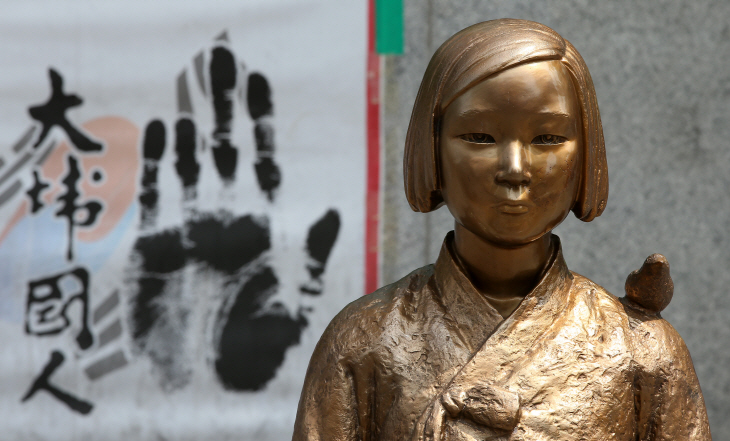- California Assembly OKs highest minimum wage in nation
- S. Korea unveils first graphic cigarette warnings
- US joins with South Korea, Japan in bid to deter North Korea
- LPGA golfer Chun In-gee finally back in action
- S. Korea won’t be top seed in final World Cup qualification round
- US men’s soccer misses 2nd straight Olympics
- US back on track in qualifying with 4-0 win over Guatemala
- High-intensity workout injuries spawn cottage industry
- CDC expands range of Zika mosquitoes into parts of Northeast
- Who knew? ‘The Walking Dead’ is helping families connect
S. Korea rejects Abe’s demand to remove sex slave statue
SEOUL (Yonhap) — South Korea on Thursday dismissed a news report saying that Japan’s premier had suggested the removal of a statue symbolizing South Korean victims of Tokyo’s sex slavery as a precondition for resolving the so-called comfort women issue.
The bronze statue of a young girl in Korean traditional attire was set up by a South Korean civic group in front the Japanese Embassy in Seoul in 2011 to raise awareness of the issue of Japan’s sexual enslavement of Korean women during World War II.
Japan’s Asahi Shimbun reported that Japanese Prime Minister Shinzo Abe proposed that South Korea eliminate the statue as a precondition for the early resolution of the issue during his summit with President Park Geun-hye on Nov. 2.
The Foreign Ministry rejected the report, expressing disappointment that Japanese media outlets have released false reports on the issue.
“It is not fact that Abe called for the removal of the statue during a summit with Park,” ministry spokesman Cho June-hyuck said at a regular press briefing. “It is regrettable that a series of groundless reports have come from Japan.”
Park and Abe agreed to “speed up” negotiations to quickly resolve the sex slave issue, a main source of diplomatic tension, during their first summit held in Seoul.
But South Korea and Japan failed to produce a specific deal on the issue during their working-level talks on Nov. 11.
South Korea demands Japan acknowledge state responsibility for the issue and offer proper compensation, while Tokyo insists the matter was settled under a 1965 treaty that normalized bilateral ties.
















